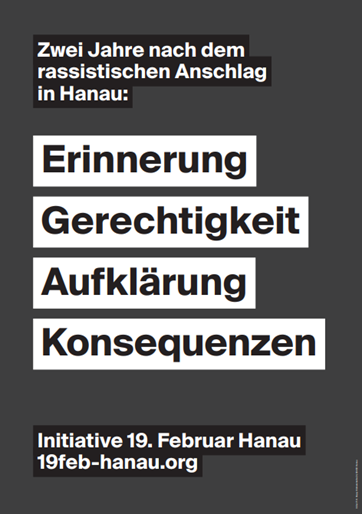#SayTheirNames: We are Hanau, we are Germany
They were waiting for a pizza, relaxing with friends or walking down the street until an extremist pulled his gun. The ensuing debate can inform us about how activism functions.
Marts d. 03 2023 · 6 minuters læsetid · Nøgleord: Protest, counterpublics and rhetorical citizenship
After a terrorist attack, one often hears the words that life must go on, that the tragedy urges us to gather around values that are celebrated in society. However, resistance against this idea can be seen in cases such as the terrorist attack in Hanau, a German city with a noticeable multicultural community. On February 19, 2020, a radicalized man murdered 9 citizens who in his view did not belong in Germany. What exactly happened during this night, and how it had been possible, were the questions that relatives and locals would not cease to ask in the time to come.

There immediately was a surge of attention and sympathy from German authorities and politicians who heard citizens’ speeches about their loss. The victims did belong, as was recounted in stories about daily encounters and the deceased Said Nesar Hashemi’s vehicle registration plate which carried the local postal code. But this sense of unity was contrasted by another opinion which became prominent half a year later:
“Yes, we have learned that nobody cares to protect young people with a history of migration.”
“Open questions are left unanswered, and we experience the blind spots of our so-called social and just state.”
“For much has been promised in the last 5 months and too little accomplished.”
“Racism has not disappeared just because politicians this time choose to speak the problem under the carpet instead of remaining silent.”
With its online call to protest, the Initiative February 19 Hanau, a group of relatives and activists that had been organizing a physical space for dialogue, turned the rhetoric political. The many untrained speakers who appeared on the stage understood the situation as a hybrid genre, suggesting that the eulogy as part of Germany’s culture of remembrance would not suffice. For reconciliation to be possible, a larger conversation about racism and the role of the state was deemed necessary.

The conversation is not isolated to a single place
How come the authorities did not act on visible signs from the perpetrator who legally possessed weapons despite a history of mental illness and a live website? Why was the emergency exit locked in one “shisha bar”? Why were victims’ bodies cut open for evidence without families’ knowing or acceptance? These are a few of the circumstances that the citizens of Hanau investigated, partly in a collaboration with professional journalists who described the attack as part of a continued history in the federal republic (and helped establish the citizens’ credibility).
In other words, the public was struggling with distrust in the state’s competence and willpower on the issues of security and freedom from discrimination. Problematic behavior in certain police groups and prior handling of racist terrorism were themes being discussed in the newspapers. The Initiative February 19 Hanau voiced the concerns of a counterpublic that the necessary policy reforms would never be realized without insistent demonstrations, still not satisfied after the announcement of 89 new federal measures against right-wing extremism.
A journalist wrote the country was awakening to the fact that the German Dream, somewhat humbler than its American equivalent and accompanied by slow but exact administration, is not equally accessible to all citizens
Keeping this effort alive required building a new community and holding conversations to discover facts and interpret them. The citizens helped each other to articulate their life experience and their wishes for the future. What the long-lasting debate on Hanau across multiple institutions shows is that believing that one has something to say and being open to other voices, for example in media, can change how societal issues are approached. After Hanau, it was the victims’ voices that were heard, although the families did not feel adequately accommodated.
Despite the sometimes alarming popular support for the Alternative for Germany, attitudes are in general becoming more open and liberal regarding multiculturalism – so the cultural scholar Moritz Schramm argues in a recent book. A journalist wrote the country was awakening to the fact that the German Dream, somewhat humbler than its American equivalent and accompanied by slow but exact administration, is not equally accessible to all citizens. But according to scholars of rhetoric such as Professor Lisa Villadsen, there tends to be progress, even if it is slow going.
The affected individuals have repeatedly exercised the patience to retell their stories and engage in drawn-out procedures such as the hearings that are still taking place in a dedicated regional committee since December 2021. While they negotiate inside, sympathizing groups gather outside. Arguments build up over time, just as the number of racist assaults have, but they may only attain decisive weight when a unique situation spurs different people to rethink their understanding.
Cand.mag. retorik
Title of the thesis: Voices of Hanau. A rhetorical criticism of counterpublic contestations regarding Germany’s pluralism (2021)

0 kommentarer